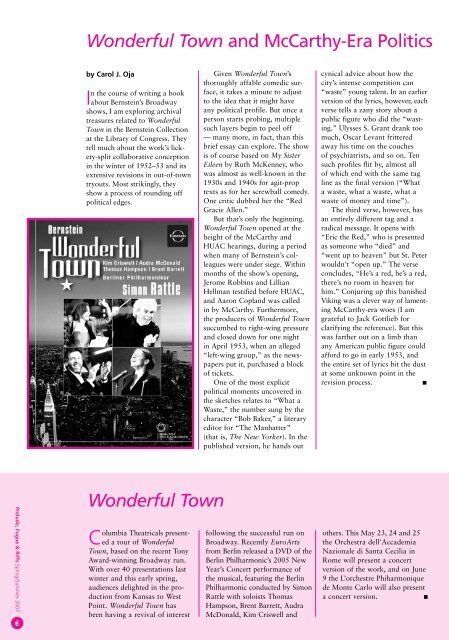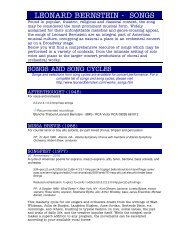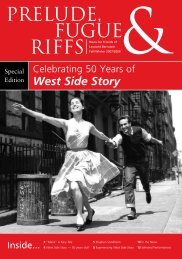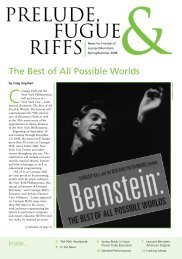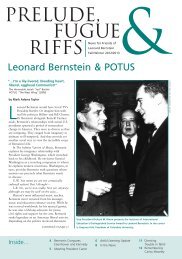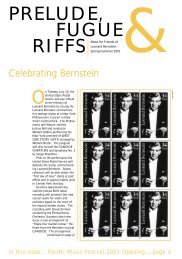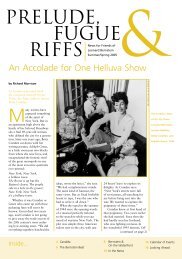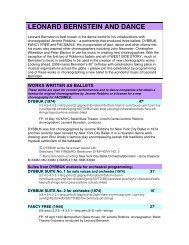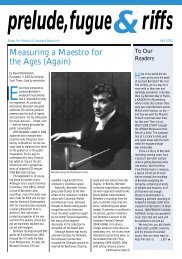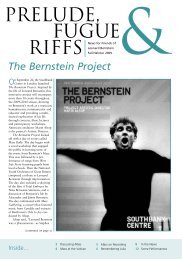You also want an ePaper? Increase the reach of your titles
YUMPU automatically turns print PDFs into web optimized ePapers that Google loves.
Wonderful Town and McCarthy-Era Politics<br />
by Carol J. Oja<br />
In the course of writing a book<br />
about <strong>Bernstein</strong>’s Broadway<br />
shows, I am exploring archival<br />
treasures related to Wonderful<br />
Town in the <strong>Bernstein</strong> Collection<br />
at the Library of Congress. They<br />
tell much about the work’s lickety-split<br />
collaborative conception<br />
in the winter of 1952–53 and its<br />
extensive revisions in out-of-town<br />
tryouts. Most strikingly, they<br />
show a process of rounding off<br />
political edges.<br />
Given Wonderful Town’s<br />
thoroughly affable comedic surface,<br />
it takes a minute to adjust<br />
to the idea that it might have<br />
any political profile. But once a<br />
person starts probing, multiple<br />
such layers begin to peel off<br />
— many more, in fact, than this<br />
brief essay can explore. The show<br />
is of course based on My Sister<br />
Eileen by Ruth McKenney, who<br />
was almost as well-known in the<br />
1930s and 1940s for agit-prop<br />
texts as for her screwball comedy.<br />
One critic dubbed her the “Red<br />
Gracie Allen.”<br />
But that’s only the beginning.<br />
Wonderful Town opened at the<br />
height of the McCarthy and<br />
HUAC hearings, during a period<br />
when many of <strong>Bernstein</strong>’s colleagues<br />
were under siege. Within<br />
months of the show’s opening,<br />
Jerome Robbins and Lillian<br />
Hellman testified before HUAC,<br />
and Aaron Copland was called<br />
in by McCarthy. Furthermore,<br />
the producers of Wonderful Town<br />
succumbed to right-wing pressure<br />
and closed down for one night<br />
in April 1953, when an alleged<br />
“left-wing group,” as the newspapers<br />
put it, purchased a block<br />
of tickets.<br />
One of the most explicit<br />
political moments uncovered in<br />
the sketches relates to “What a<br />
Waste,” the number sung by the<br />
character “Bob Baker,” a literary<br />
editor for “The Manhatter”<br />
(that is, The New Yorker). In the<br />
published version, he hands out<br />
cynical advice about how the<br />
city’s intense competition can<br />
“waste” young talent. In an earlier<br />
version of the lyrics, however, each<br />
verse tells a zany story about a<br />
public figure who did the “wasting.”<br />
Ulysses S. Grant drank too<br />
much, Oscar Levant frittered<br />
away his time on the couches<br />
of psychiatrists, and so on. Ten<br />
such profiles flit by, almost all<br />
of which end with the same tag<br />
line as the final version (“What<br />
a waste, what a waste, what a<br />
waste of money and time”).<br />
The third verse, however, has<br />
an entirely different tag and a<br />
radical message. It opens with<br />
“Eric the Red,” who is presented<br />
as someone who “died” and<br />
“went up to heaven” but St. Peter<br />
wouldn’t “open up.” The verse<br />
concludes, “He’s a red, he’s a red,<br />
there’s no room in heaven for<br />
him.” Conjuring up this banished<br />
Viking was a clever way of lamenting<br />
McCarthy-era woes (I am<br />
grateful to Jack Gottlieb for<br />
clarifying the reference). But this<br />
was farther out on a limb than<br />
any American public figure could<br />
afford to go in early 1953, and<br />
the entire set of lyrics bit the dust<br />
at some unknown point in the<br />
revision process.<br />
■<br />
Prelude, Fugue & Riffs Spring/Summer 2007<br />
6<br />
Wonderful Town<br />
Columbia Theatricals presented<br />
a tour of Wonderful<br />
Town, based on the recent Tony<br />
Award-winning Broadway run.<br />
With over 40 presentations last<br />
winter and this early spring,<br />
audiences delighted in the production<br />
from Kansas to West<br />
Point. Wonderful Town has<br />
been having a revival of interest<br />
following the successful run on<br />
Broadway. Recently EuroArts<br />
from Berlin released a DVD of the<br />
Berlin Philharmonic’s 2005 New<br />
Year’s Concert performance of<br />
the musical, featuring the Berlin<br />
Philharmonic conducted by Simon<br />
Rattle with soloists Thomas<br />
Hampson, Brent Barrett, Audra<br />
McDonald, Kim Criswell and<br />
others. This May 23, 24 and 25<br />
the Orchestra dell'Accademia<br />
Nazionale di Santa Cecilia in<br />
Rome will present a concert<br />
version of the work, and on June<br />
9 the L’orchestre Phiharmonique<br />
de Monte Carlo will also present<br />
a concert version.<br />
■


